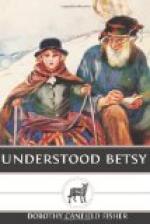Elizabeth Ann drew a long breath of relief and pride, and looked to Uncle Henry for praise. But he was busily setting down figures as though he were getting his ’rithmetic lesson for the next day and had not noticed ... Oh, there they were going to the left again! This time, in her flurry, she made a mistake about which hand was which and pulled wildly on the left line! The horses docilely walked off the road into a shallow ditch, the wagon tilted ... help! Why didn’t Uncle Henry help! Uncle Henry continued intently figuring on the back of his envelope.
Elizabeth Ann, the perspiration starting out on her forehead, pulled on the other line. The horses turned back up the little slope, the wheel grated sickeningly against the wagonbox—she was sure they would tip over! But there! somehow there they were in the road, safe and sound, with Uncle Henry adding up a column of figures. If he only knew, thought the little girl, if he only knew the danger he had been in, and how he had been saved ... ! But she must think of some way to remember, for sure, which her right hand was, and avoid that hideous mistake again.
And then suddenly something inside Elizabeth Ann’s head stirred and moved. It came to her, like a clap, that she needn’t know which was right or left at all. If she just pulled the way she wanted them to go— the horses would never know whether it was the right or the left rein!
It is possible that what stirred inside her head at that moment was her brain, waking up. She was nine years old, and she was in the third A grade at school, but that was the first time she had ever had a whole thought of her very own. At home, Aunt Frances had always known exactly what she was doing, and had helped her over the hard places before she even knew they were there; and at school her teachers had been carefully trained to think faster than the scholars. Somebody had always been explaining things to Elizabeth Ann so industriously that she had never found out a single thing for herself before. This was a very small discovery, but an original one. Elizabeth Ann was as excited about it as a mother-bird over the first egg that hatches.
She forgot how afraid she was of Uncle Henry, and poured out to him her discovery. “It’s not right or left that matters!” she ended triumphantly; “it’s which way you want to go!” Uncle Henry looked at her attentively as she talked, eyeing her sidewise over the top of one spectacle-glass. When she finished—“Well, now, that’s so,” he admitted, and returned to his arithmetic.
It was a short remark, shorter than any Elizabeth Ann had ever heard before. Aunt Frances and her teachers always explained matters at length. But it had a weighty, satisfying ring to it. The little girl felt the importance of having her statement recognized. She turned back to her driving.
The slow, heavy plow horses had stopped during her talk with Uncle Henry. They stood as still now as though their feet had grown to the road. Elizabeth Ann looked up at the old man for instructions. But he was deep in his figures. She had been taught never to interrupt people, so she sat still and waited for him to tell her what to do.




